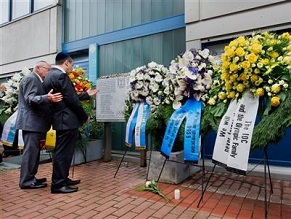|
World Jewish News

Israeli Deputy Prime Minister Silvan Shalom (R) and President of the Israeli National Olympic Commitee Zvi Varshaviak take part in a wreath laying ceremony at the commemoration plate for the 11 victims of the 1972 Munich Olympics massacre, on September 5.
|
Tears, anger 40 years after Munich Olympics killings
06.09.2012, History Survivors, relatives and officials paid solemn tribute on Wednesday to 11 Israeli athletes killed during the 1972 Munich Olympics by Palestinian terrorists, at the site of the massacre 40 years ago.
About 600 guests passed tight security checks to attend a ceremony at Fuerstenfeldbruck air base, west of Munich, where a hostage-taking by Palestinian group Black September reached its tragic climax.
On September 5, 1972, eight members of the terrorist group, disguised as security guards and trash collectors, infiltrated the Olympic Village in what was then Munich, West Germany. Once inside the village, they burst their way in to the dorm housing the Israeli team, killing two team members and taking nine others hostage.
A bungled rescue operation resulted in all the hostages being killed along with a German policeman and five of the eight hostage-takers.
The news sent shock waves through Germany just 27 years after the Holocaust and opened a deep rift with Israel.
"Were we too naive? Did we underestimate the terrorist threat? These questions remain," German Interior Minister Hans-Peter Friedrich said at Wednesday’s ceremony.
Many of the guests wore dark glasses and brushed away tears as an ecumenical memorial service marked the anniversary, which has prompted new questions about the turn of events on German soil.
Under grey skies and with flags flying at half-mast, white candles lined a podium over which hung large black and white photos of the Israeli athletes and coaches who were killed.
Ankie Spitzer, widow of fencing coach Andre Spitzer, said the trip to Germany brought back painful memories of the authorities' "disastrous rescue attempt".
"For us, families of the victims and those of the Israeli delegation who were fortunate enough (to survive) Munich, Germany will be linked forever to this saddest day in our lives," she said.
She condemned "the incompetence, the stupidity and the arrogance" of the West German security officials "who should have saved the athletes" and demanded "a new investigation on the failures of the authorities in 1972".
"It's not our profession, it's not a hobby, it's not an obsession," she said. "It's just our right to know what happened."
The police "didn't make even a minimal effort to save human lives", former Mossad chief Zvi Zamir said at the time after returning from Munich.
German magazine Der Spiegel has accused the government and Olympic organisers of covering up grave mistakes.
Months before the hostage-taking, the interior ministry and the Bavarian state police warned federal authorities in vain of the possibility of "terrorist acts" at the Games, the magazine said.
The head of the Munich police evidently feared that a robust security presence would revive ugly memories of the 1936 Games in Berlin, presided over by Nazi leader Adolf Hitler.
Israeli Deputy Prime Minister Silvan Shalom said "40 years ago, the young state of Israel went through one of its most tragic days ever". He stressed the enduring threat facing Israel, citing the deadly July attack against Israeli tourists in Bulgaria and Iran's nuclear programme as just two examples.
The leader of Germany's Jewish community, Dieter Graumann, condemned the refusal of the International Olympic Committee to mark the 40th anniversary of the bloodbath with a minute's silence at the opening ceremony of the London Games this summer.
At a memorial ceremony during the London Games, Ankie Spitzer shouted "Shame on you!" to the International Olympic Committee for failing to offer a moment of silence.
"Shame on you IOC, because you have forgotten 11 members of the Olympic family," she said in a voice laden with passion.
by: Maud Swinnen
EJP
|
|
